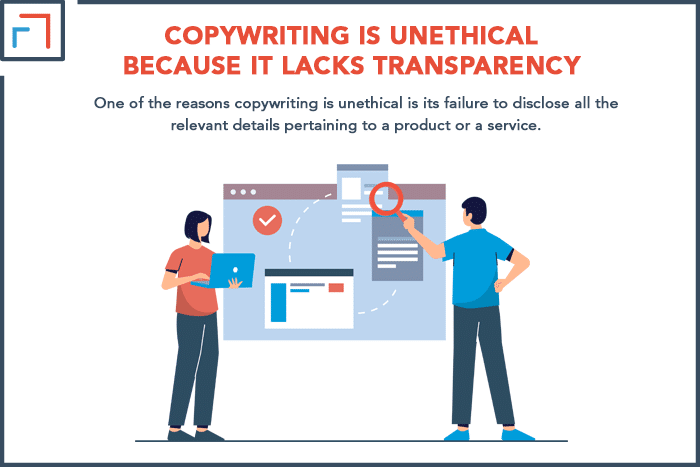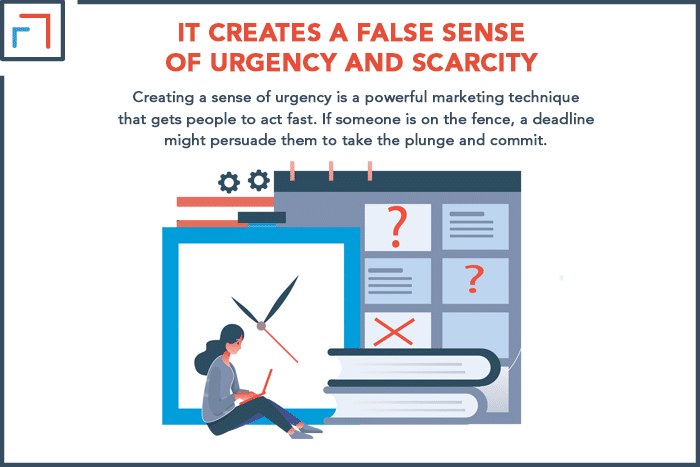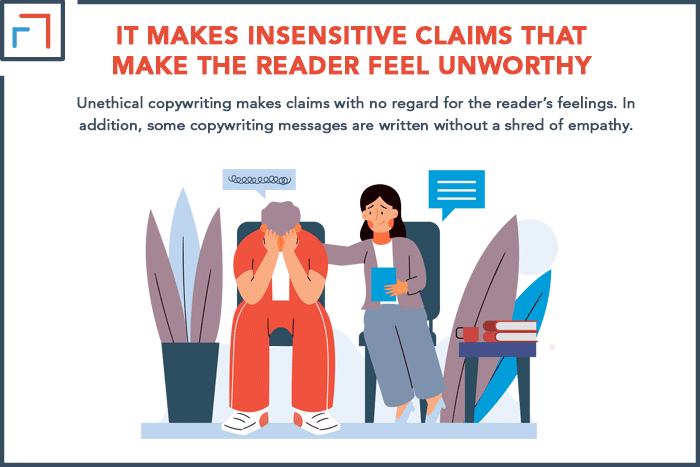Copywriting is a highly valued skill because good copy can convince readers to take action, hence driving conversions. However, not all copywriting is good. Some copywriters use unethical practices to achieve their goals at the expense of the consumer. What makes copywriting unethical?
Copywriting is unethical in situations where copywriters fail to disclose essential product details, create a fake sense of urgency or make bold claims that shame the readers. While these tactics may generate some sales, they often have horrible consequences because they are misleading.
Below, we will discuss some reasons why copywriting is unethical and the consequences of using unethical tactics. Keep reading to find out which costly copywriting pitfalls to avoid.
3 Common Reasons Copywriting Is Considered Unethical
Copywriting ceases to be ethical when marketers use underhanded techniques to manipulate readers into taking action.
These practices may bring in results initially but will result in huge brand damage in the long run. Below are factors that make copywriting unethical.
1. Copywriting Is Unethical Because It Lacks Transparency
One of the reasons copywriting is unethical is its failure to disclose all the relevant details pertaining to a product or a service.
Some shady copywriters intentionally withhold important information because they know it may deter sales.
Although this tactic works, it’s just a band-aid solution that will eventually stop bringing in results. Once consumers purchase and use a product, they will quickly discover the truth.
This form of marketing is most common in the fields of coaching, health, and wealth management.
The high use of deception in these sectors may be attributed to the high levels of fear surrounding money and health.
For instance, many people are trying to lose weight and they will seek out products and services that will help them achieve this goal.
Unfortunately, many people are desperate to lose weight to the point that they keep buying weight-loss products that do not work.
Manufacturers and copywriters may overstate the effectiveness of their products in order to increase sales.
Some weight loss products claim to help people lose weight in 24 hours. But that is not logically or scientifically possible. That can only tell you one thing: the advertiser is not telling the truth.
You might also consider those who are selling high-value money-making courses.
They promise that anyone who buys the course will access some sort of secret winning formula that will lift them from earning zero to six figures in a month or so.
Once again, this is almost never the case. Had they been transparent, such coaches would have revealed that, for example, they had huge capital that enabled them to take risks.
This means someone without adequate funds would not attain the same results.
The ability to spin the message of copy is valuable, but it can be used to gloss over the issues with a product or service. This is why copy that lacks transparency is considered unethical.

What Are The Effects Of Lack Of Transparency?
Failing to provide all the details impacts not only the customer but the brand as well. Customers will despise a brand once they realize they were tricked into purchasing it.
Had the copywriter not omitted some details, consumers probably wouldn’t have made the purchase in the first place.
For example, in the Volkswagen scandal, the brand failed to disclose that its cars produced high emissions. Instead, they stated that their emissions were in the required range.
When customers later discovered the truth, they stopped buying from the company, and the sales went down.
2. It Creates A False Sense Of Urgency And Scarcity
Creating a sense of urgency is a powerful marketing technique that gets people to act fast. If someone is on the fence, a deadline might persuade them to take the plunge and commit.
This tactic is fine when you are genuinely running out of stock. Maybe you are offering a product for the last time and won’t be producing it again in the near future.
The problem arises when brands create artificial scarcity in order to boost their sales. They create a fake countdown that puts customers into a panic.
While this may work in the short term for one-off customers, it ultimately fails as a strategy. FOMO can only take you so far, especially once people realize you’re not actually running out of your product.
What Are The Effects Of Creating Fake Urgency?
When customers make purchases based on fear, they will not truly value the product. Buyers’ remorse may kick in when they realize they didn’t actually need whatever you’re selling.
This will make them feel manipulated and they will never trust the brand again.
Another effect is that customers feel alienated and undervalued, especially if they miss out on an item with false scarcity.
For instance, when Mailbox was still new, they ran controlled invites to new users. Those who were invited ended up at the back of the queue and they had to wait for an unknown period.
The group that was kept waiting soon felt alienated and undervalued. They went to the App Store and left ugly reviews for the infant app. Instead of boosting sales, this app shot itself in the foot.
Finally, if you always act like it’s the end of the world, customers will learn to ignore you. You’ll become the brand that cried wolf.
Copywriters are supposed to drive action, but they can’t treat every message like it’s the most important thing in the world.
For instance, Gap, a clothing retail company, would sometimes send over 5 urgent emails in a week. Soon, customers started to ignore them, leaving their emails unopened.
This meant that they ultimately lost customers because they were too desperate for interaction.

3. It Makes Insensitive Claims That Make The Reader Feel Unworthy
Unethical copywriting makes claims with no regard for the reader’s feelings. In addition, some copywriting messages are written without a shred of empathy.
For instance, how would an ad that reads “Cancer solutions discovered. 100% natural with 97% success rate” feel to someone who just watched their loved one waste away to cancer in a hospital bed?
In another instance, Molly Mae, the director of Pretty Little Thing, claimed that everyone has access to the same 24 hours each day.
While it is true that a day has 24 hours, it doesn’t mean everyone has the same ability to work or earn a given wage. A message like this just makes people feel upset.
This message makes it sound like Molly Mae views those who earn less than her as either lazy or ignorant of the existing opportunities.
Aside from making people feel unworthy, her words lack empathy for those living with chronic illnesses, disabilities, or poverty.
This is also true for those motivational coaches who tell people that they are their own enemies.
Such statements are only true to some extent because the conditions of living vary greatly from one person to another.
What Are The Effects Of Copywriting Claims That Make Others Feel Unworthy?
One of the worst effects of this kind of copywriting is that it plants a feeling of unworthiness in the minds of the target audience.
For example, a pop ad with a call to action that says “No, I don’t want to succeed” makes the audience feel bad about themselves if they click on it to reject an offer.
Unethical copywriting produces feelings of resentment and makes the audience want to boycott the advertised products. Your copy should not rely on guilt, fear, or insecurity.
Making your audience feel bad might convince them to buy once, but it will quickly turn them against you.

Final Thoughts
Most copywriters who use unethical methods to make sales miss the mark.
Good copywriting does not focus on getting conversions for the short term. Ideally, you’re aiming to create a long-lasting relationship with customers.
Unsuspecting buyers may buy before realizing they are being misled. When they discover the truth, customers lose interest and trust in your brand and may never buy from them again.
This can be a huge blow because customer retention is often more important than customer acquisition. Therefore, copywriters should steer clear of the above practices and write connection-based content.
That way, they can reap the benefits of proper copywriting.
